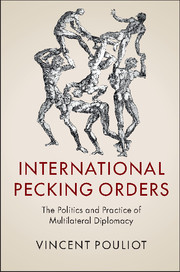Book contents
- Frontmatter
- Contents
- List of figures
- List of tables
- Preface and acknowledgments
- List of abbreviations
- Introduction: All the world's a stage
- Part I Situations
- Part II Dispositions
- Part III Relations
- 5 Permanent representation: relational structure and practical logics
- 6 Clan politics: Security Council reform and the UN pecking order
- Part IV Positions
- Conclusion: The “miracle” of multilateral pecking orders
- Appendix: Research design, methods and data
- References
- Index
6 - Clan politics: Security Council reform and the UN pecking order
from Part III - Relations
Published online by Cambridge University Press: 05 March 2016
- Frontmatter
- Contents
- List of figures
- List of tables
- Preface and acknowledgments
- List of abbreviations
- Introduction: All the world's a stage
- Part I Situations
- Part II Dispositions
- Part III Relations
- 5 Permanent representation: relational structure and practical logics
- 6 Clan politics: Security Council reform and the UN pecking order
- Part IV Positions
- Conclusion: The “miracle” of multilateral pecking orders
- Appendix: Research design, methods and data
- References
- Index
Summary
As the “parliament of man,” the UN is the centerpiece of contemporary global governance. Its many organs, specialized agencies, departments and bureaus form a particularly complex organizational patchwork. In the limited scope of this chapter, I make no claim to capture UN politics writ large. In any case, at the UN there is not one pecking order but several of them, depending on the organ of interest, the topic under discussion and the participating members. My more limited objective is to put some more empirical meat on the theoretical bones that I assembled in Chapter 5. More specifically, I want to show how the practical logics of multilateral diplomacy, as enabled and constrained by its peculiar relational structure, actually play out in a large setting such as the UN. To this purpose, I look at one specific site and topic in order to open a window onto UN pecking order dynamics: ongoing General Assembly debates over the reform of the Security Council.
The case of the reform of the Security Council offers a unique vantage point on social stratification in world politics. Nowhere else do states debate as explicitly on the international pecking order and the principles by which a privileged few are granted special status and powers. Debates about the Security Council are all the more important in that the organization “is the most powerful international institution in the history of the nation-state system.” Not only is its sphere of authority continually expanding, the Council has also become a placeholder for a new form of sovereignty, which states generally acknowledge. For these reasons, the Security Council is probably the multilateral site around which countries and delegates strive the most intensively for recognition and standing. In that sense, the Security Council reform process constitutes an unprecedented instance in the history of world politics in which states attempt to transform the centerpiece of the institutional architecture of global security governance not through war, but by peaceful means.
The chapter shows how the relational peculiarities of UN diplomacy limit the potential for meaningful Security Council reform. The clan structure of the negotiations leads to rigid group dynamics that are little conducive to compromise. What is more, the tight leash under which the negotiating chair is held, as well as the heavy formalism of the local rules of the game, significantly blunt the possibility for progress.
- Type
- Chapter
- Information
- International Pecking OrdersThe Politics and Practice of Multilateral Diplomacy, pp. 154 - 190Publisher: Cambridge University PressPrint publication year: 2016

